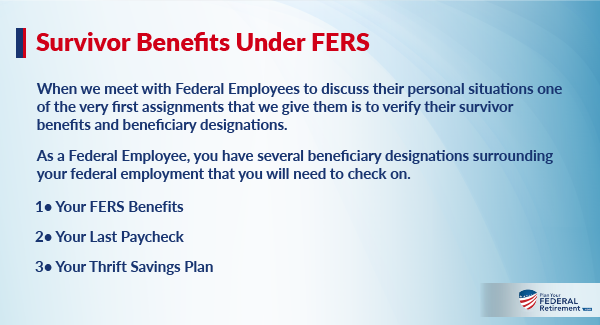As a Federal Employee under the Federal Employee Retirement System (FERS) your retirement benefits are based on what we have coined as a “three-legged stool”
- Your FERs Pension
- Your Thrift Savings Plan
- Your Social Security Benefits
Navigating your benefits when you plan for retirement is complex by itself.
Once you have determined your retirement benefits the next step is to determine, what benefits if any will your surviving spouse be left upon your passing?
Pat asks this question and from his online research scouring the Social Security office’s website, addresses some of the confusion that most of the Federal Employees that we visit with have, “if I predecease my spouse, what will their social security benefits be?”
Survivor Benefits Under FERS
When we meet with Federal Employees to discuss their personal situations one of the very first assignments that we give them is to verify their survivor benefits and beneficiary designations.
As a Federal Employee, you have several beneficiary designations surrounding your federal employment that you will need to check on.
- Your FERS Benefits.
- Your Last Paycheck
- Your Thrift Savings Plan
These beneficiary designations are critical to check before you retire regardless of where you are at with your federal service.
Each one pertains to your employment benefits specifically as a Federal Employee.
Once you have made sure that those benefits are verified, you can start looking and planning for outside of your federal benefits, like social security survivor benefits.
Social Security Survivor Benefits
When you reach your Full Retirement Age (FRA) which is based on your birthday, you are eligible for full social security benefits. During your working years, you made a contribution to the social security administration so that when you reached FRA you can make a withdrawal monthly.
Let’s assume that in our example Pat’s Full Retirement Age is age 66. When he reaches age 66 we will say that his monthly social security benefit is $2,000.
Pat’s wife started drawing her social security benefits early at age 62, receiving a permanent penalty on her benefits by drawing before she reached the full retirement age. Because of this permanently reduced benefit, we will say that she is receiving $800 a month.
Pat’s Social Security benefits at FRA = $2,000 a month
Pat’s Wife Social Security benefits at age 62 = $800 a month
As a legally married spouse, Pat’s wife is entitled to one of two social security benefits:
100% of her benefit
50% of Pat’s social security
While Pat is alive, once he reaches his FRA and starts drawing, in our example, $2,000 a month his wife is entitled to either keep receiving her social security benefits at $800 a month OR, she can file for 50% of Pat’s social security benefits. In this case, she could draw $1,000 a month from the social security office without impacting Pat’s social security at all.
Pat’s Social Security benefits at FRA = $2,000 a month
Pat’s Wife takes 50% of Pat’s social security benefits = $1,000 a month
Upon Pat’s passing, regardless of what age he is or whether or not he was drawing social security, Pat’s wife is entitled to 100% of her own benefit or 100% of Pat’s benefits.
Pat’s Social Security benefits = $2,000
Pat’s wife, upon Pat’s passing, receives 100% of his benefit or, 100%of hers.
Regardless of whether or not Pat had been receiving benefits from the social security office, his surviving spouse is still entitled to 100% of his benefit or 100% of her own benefits.
Survivor Benefits
As a federal employee, it is critical that you have an income plan that runs scenarios for both retirees being alive and regrettably, if one passes prematurely.
When you’re working with your Financial Advisor and developing a financial plan that coordinates your benefits as a federal employee, this is one of the topics that they should be regularly addressing with you.
If you have questions about how financial planning works for you specifically, feel free to reach out to us for a one on one consultation with one of your financial planners.
If you have a question that is perfect for the FERS Federal Fact Check, submit it now! We love hearing from Federal Employees and diving into their questions.




